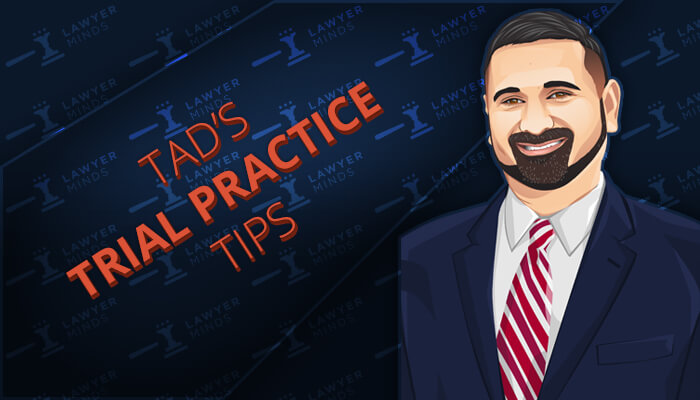The Rising Need for Shorter Trials

Join me as I talk tips for upping your trial performance. I’ll cover all aspects of the trial, including, jury selection, opening statements, direct witness testimony, cross-examination, closing arguments, jury instructions, and verdicts. Discussions are welcome in the comments section.
— Tad Thomas
Balancing the pace of a trial with quality case presentation remains a challenge in many instances. While timeliness and quality of justice seem to be at odds with one another, they don’t have to be.
New trial lawyers often think they need to throw everything against the wall in order to give their client’s case the best chance at success. As a result, trials begin to stretch out, witness examinations run long and jurors can get fatigued, which can potentially jeopardize a case.
Every trial is different and the time it takes to present the case to the jury properly varies depending upon the facts, the complexity of the claims, the actions taken by the opposing party, and how the judge manages the trial. However, studies show that jurors are more likely to understand the case by giving it to them quick and dirty rather than dragging things out. Let’s take a look at the benefits of expediting a trial and what steps you can take to do so.
The Benefits of a Shorter Trial
The benefits of a shorter trial have more to do with winning over the jurors than anything else. When you take steps to shorten a trial, you’ll be more likely to capture the jurors’ attention span. Jurors nowadays are used to getting information in 30 or 60 second sound bites. So, being able to nail down your points and prove your case will make it less likely that you’ll lose the jurors’ attention or that they’ll get frustrated.
Research suggests attention spans are shorter than ever. That needs to be taken into account when building a case and presenting it during trial. In “What Jurors Want to Know: Motivating Juror Cognition to Increase Legal Knowledge & Improve Decisionmaking,” Sara Gordon from the Tennessee Law Review discusses how people are more likely to pay attention when they are motivated to be accurate. If jurors believe their accuracy goals have the ability to shorten the length of time they spend as jurors, they are more likely to pay attention to your points and have a solid understanding of your argument.
Tips for Making Trial Shorter
The shorter you can make a trial, the better. New lawyers often fail to think about how to simplify things—or the benefits of doing so. To start, nail down what you need to convey your argument. To avoid overwhelming witnesses or jurors, make a list of ten or twelve points you know you need to make to win your case. Once you have a clear idea of what you need to convey during trial, you can focus on what you can do in regard to jury selection, witnesses, and opening and closing statements to make trial shorter.
Witnesses
Make a list of your witnesses. Review that list with the points you know you need to make in the case and decide which witnesses you’re going to discuss each point with. You may think that you need to review every point with every witness, but that is not the case. If anything, that could be detrimental—especially if the same information is repeated over and over again. Also, remember that demonstrative evidence helps you focus on your specific points and what’s important. It can help you simplify complex terms for jurors and make witness testimony easier for jurors to digest.
Opening Statements
Take steps to shorten your opening statement. You don’t need to argue the entire case. Not only is it against the rules to do so, but it’s also an ineffective use of your time. Essentially, you want your opening statement to be an overview of your points. Cover what you intend to show, but refrain from going into too much detail. Remember that if voir dire occurred, the jurors are already aware of some facts. You don’t need to repeat that information verbatim in the opening statement.
Closing Arguments
During your closing it’s easy to slip into reiteration. As a young trial lawyer, I often felt the need to reiterate every point I made in trial, I didn’t know enough to understand jurors hate this. During the closing argument, you should spend most of the time empowering the jury to rule in your favor. Essentially, provide a short summary of why you should win the case and try to talk to the jurors you think are most likely to be your advocates in the jury room.
While there are certain factors that are out of your control when it comes to the length of your client’s case, the above tips can encourage a shorter trial which leads to more attention from your jurors and, hopefully, a just verdict for your client.

